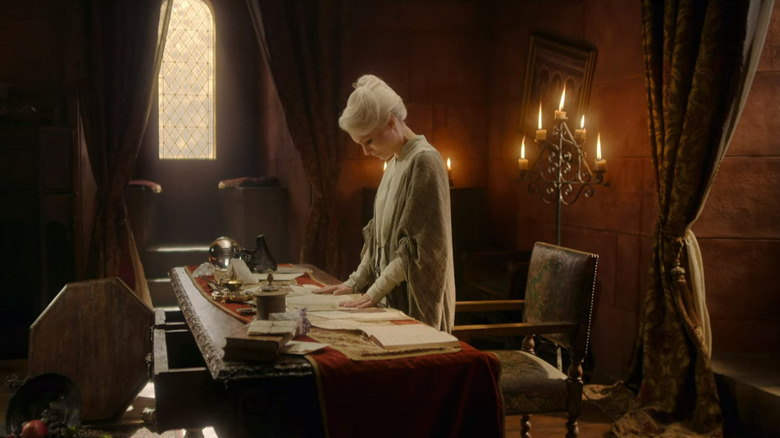The Witcher Season 3: The Real Reason For [SPOILER]'s Tragic Fate
The ending of "The Witcher" Season 3 Volume 2 is ... bleak. In Episode 8, "The Cost of Chaos," Tissaia de Vries (MyAnna Buring) takes her own life. Although the Netflix series does not show it on-screen, unlike the source material, Andrzej Sapkowski's novel "The Time of Contempt," enough context is provided for audiences to understand exactly what happens ... and how. Before this final act, however, Tissaia writes a letter to Yennefer of Vengerberg (Anya Chalotra), which she leaves for her student to find.
It reads, "One of the first things we learn about Chaos is that it always has consequences. There is a cost to this magic. And eventually, we all must pay. It is not a gift. It is a trade. And often, that trade leads us to dark places. But there are always bright spots. Teaching you has been the biggest bright spot of my life. And I would love to see you through the next leg of your journey. I know you will do great things, my daughter. But I'm afraid I cannot. There is a cost I must pay. Sometimes a flower is just a flower. And the best thing it can do for us is die."
TIssaia's poetic final words are loaded with meaning, even if that meaning isn't directly stated. She writes at length about consequences because she blames herself for the Thanedd coup. Although Vilgefortz of Roggeveen (Mahesh Jadu) is responsible for the death and destruction wrought on Aretuza that day, she blames herself for trusting him. Worse, she blames herself for loving him ... and for pleading with him until the last possible moment.
Tissaia de Vries is a mage with powerful convictions
Tissaia is one of the strongest characters on "The Witcher," with Netflix painting the mage as someone mighty in both power and fortitude. Regardless of the morality of her decisions, such as transforming failing pupils at Aretuza into eels that power Thanedd Island's connection to Chaos, Tissaia always commits with the sort of conviction only held by individuals who genuinely believe that they're doing the right thing. That's why Vilgefortz's treachery shatters her so completely. Think about it like a disciplined perfectionist – if she was wrong about him, what else could she have been wrong about?
And with her mind on fire with anger and hurt and doubt, it's no wonder that Tissaia reacts so recklessly. When she casts Alzur's Thunder upon her enemies, it's with zero concern for her own well-being. But that recklessness does not follow her into Season 3, Episode 8. As she writes her suicide note, Tissaia is calm and collected. She enjoys her pipe one last time, her expression serene with a familiar determination. She doesn't write that she's a failure. She doesn't write that she's worthless. She writes, "There is a cost I must pay." And she writes it with the same calculated confidence that she approaches everything else with.
Although her final moments may easily be viewed as the continued abysmal treatment of women on "The Witcher," they may also be viewed as the culmination of a character driven by a hunger for balance. In this case, both seem true.
If you or someone you know is struggling or in crisis, help is available. Call or text 988 or chat 988lifeline.org

